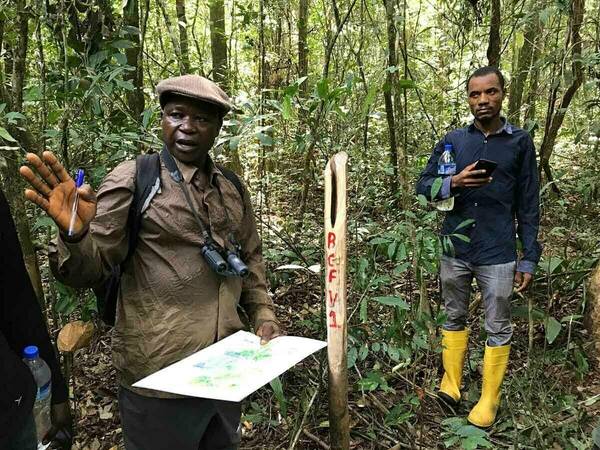Using forest resources strengthens food security, study finds

Forests can reduce hunger in rural households while also capturing carbon and advancing sustainability goals for low- and middle-income countries, according to new research by University of Notre Dame experts.
Households in Liberia that participated in forest-based activities — including collecting and processing timber, hunting bushmeat or gathering edible plants — reduced their food scarcity by 84 percent, according to a study published in the journal Food Security. The research was conducted by Daniel C. Miller, associate professor of environmental policy at Notre Dame’s Keough School of Global Affairs, and co-author Festus Amadu, a former Notre Dame postdoctoral researcher who is now assistant professor of climate policy at Florida Gulf Coast University.
“Previous research has shown that forests benefit people, but now we have evidence on a national scale,” Miller said. “Forests are a vital source of food security for forest-adjacent households in Liberia, the most forested country in West Africa.”
Miller and Amadu analyzed data from a 2019 survey by the Liberian government and the World Bank. Miller, a former World Bank senior forestry specialist, helped design the survey, which collected data from nearly 3,000 households living near forests across all 15 counties in Liberia. The researchers found that when households reported engaging in forest-based activities, they also reported food insecurity for almost three fewer months out of the year.
Food insecurity is severe in many countries in sub-Saharan Africa, including Liberia, where most rural households do not have access to enough food to meet their daily calorie intake requirements for the whole year, Miller said. Causes of this food insecurity include extreme weather events, political instability, and poor agricultural productivity caused by natural resource depletion. Existing research shows that forests may be more resilient to some of these stresses, making them increasingly vital for reducing food insecurity in countries such as Liberia, where forests comprise 69 percent of its land area.
“Forests do a lot of things for us as human beings, and yet their manifold contributions are not systematically studied and documented,” Miller said. “While forests will never substitute for agriculture on any large scale, they can serve as an important food source, particularly in lean times.”
Miller said the study’s methodology — using forest-specific data acquired on a national scale — could be applied to other forest-rich, economically poor countries in West Africa and elsewhere to further understand how forests can mitigate food insecurity.
“Forests can and should be considered by national governments in other countries not only for their climate and environmental benefits, but for their potential to support human development and well-being,” he said.
The research was supported by the Forests & Livelihoods: Assessment, Research and Engagement (FLARE) network, which Miller leads, with funding from Notre Dame Research, the Notre Dame Environmental Change Initiative and the Keough School.
In future studies, Miller and Amadu will examine how forest governance, particularly at the community level, affects how people living near forests can benefit from them. Miller also said the study’s findings have important policy implications and could be used by policymakers focused on forest management and conservation.
“The benefits that forests create for the citizens of a country are yet another reason why forests are worth managing well and conserving,” Miller said. “When you have empirical evidence at the national level, it becomes relevant not only in scholarship but also for the policy realm.”
Originally published by Renée LaReau at keough.nd.edu on July 22.
Contact: Tracy DeStazio, associate director of media relations, 574-631-9958 or tdestazi@nd.edu
Latest Colleges & Schools
- Prioritizing prenatal care may decrease low birth weight outcomes in The Gambia, Notre Dame research findsA new study co-authored by University of Notre Dame researchers highlights the importance of prenatal care for improving the health of mothers and newborns, providing evidence that can inform policy.
- Partial peace deals may facilitate comprehensive accords, offering roadmap for policymakers, practitionersPartial peace agreements — deals that address targeted issues on the way to larger comprehensive accords — could provide a blueprint for peacebuilding policymakers and practitioners, according to new University of Notre Dame research.
- Notre Dame Law School launches new Veterans Law ClinicNotre Dame Law School is launching a new Veterans Law Clinic, dedicated to providing free legal assistance to U.S. military veterans in matters such as disability claims and appeals.
- City of Gary and Notre Dame’s Housing and Community Regeneration Initiative announce vision and action plan for downtown GaryThe City of Gary and the University of Notre Dame School of Architecture’s Housing and Community Regeneration Initiative announced a “Vision and Action Plan” for downtown Gary during a news conference Tuesday (May 27). The final report serves as a roadmap for Gary’s leadership to follow to reestablish the city’s building culture.
- Notre Dame Executive MBA offers scholarships to area leadersMichiana Forty under 40 honorees can receive $30,000 toward tuition for the Notre Dame EMBA program.
- Kenneth Scheve appointed dean of the University of Notre Dame’s College of Arts and LettersKenneth Scheve, the Dean Acheson Professor of Political Science and Global Affairs and the dean of social science at Yale University, has been appointed the I.A. O’Shaughnessy Dean of the College of Arts and Letters by University of Notre Dame President Rev. Robert A. Dowd, C.S.C. Scheve, who will also hold a tenured faculty position in the Department of Political Science, begins a five-year term as dean on July 1.













